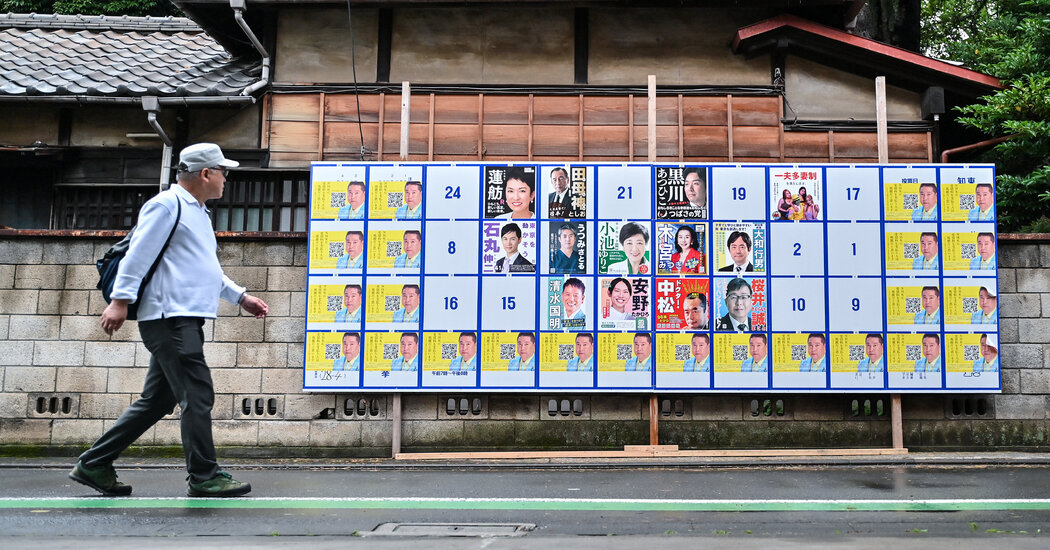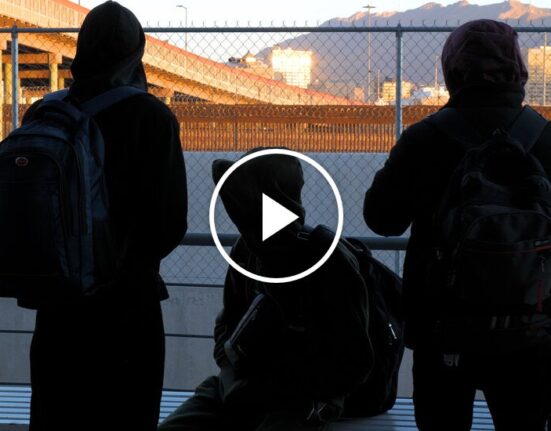When voters in Tokyo cast their ballot for governor of the world’s largest city on Sunday, they will be spoiled for choice.
Fifty-six candidates are contending for the office, a record. One who styles himself “the Joker” has proposed legalizing marijuana and says polygamy can address the nation’s declining birthrate. Another is a pro wrestler who hides his face on camera and vows to use artificial intelligence to complete governmental tasks. There’s a 96-year-old inventor who says he will deploy gas-fueled cars that do not emit carbon, and a 31-year-old entrepreneur who took off her shirt during a campaign video and promised “fun things.”
It might look like democracy run amok. But in fact, the race is profoundly status quo and the incumbent is projected to win a third term.
The proliferation of candidates reflects fatigue with politics as usual, and many of them are unserious attention seekers, creating a farcical, circuslike atmosphere and putting real change further out of reach.
“I wonder if this is democracy in action, or whether it’s like an ‘up yours’ to democracy,” said Emma Dalton, a senior lecturer in Japanese Studies at La Trobe University in Melbourne, Australia. Multiple candidates have criticized the incumbent, Yuriko Koike, “in the most vulgar way,” said Ms. Dalton. “Because they know she’s going to win.”
The Tokyo election is emblematic of Japanese politics, where at the national level the Liberal Democratic Party has governed for all but four years since 1955. The party, which is backing Ms. Koike, has held an iron grip on Japan’s Parliament, despite numerous scandals and widespread voter dissatisfaction that is expressed in polls but rarely at the ballot box.
Ms. Koike, 71, has been dogged by questions about her university credentials and has refused to address accusations that she is connected to a large real estate developer involved in several controversial projects. But just as the Liberal Democrats stay in power despite low approval ratings, she may be benefiting from a feeling that there is no need to upset the apple cart at a time of relative prosperity.
Despite some widening inequality and pockets of poverty, “most middle-class citizens are satisfied with their lives in Tokyo,” said Jiro Yamaguchi, a political scientist at Hosei University in Tokyo.
Although Ms. Koike has not entirely delivered on promises to eliminate day care waiting lists, reduce commuter train congestion and abolish overtime among municipal workers, she has used a budget surplus to provide subsidies for families with children and free tuition to private high schools in the city.
Ms. Koike did not grant an interview request. Mitsui Fudosan, the developer involved in the building projects, said in an email that it had “no close relationship” with the governor and had not “been provided any special favors.”
At first, the Tokyo governor’s race seemed to promise a referendum on the Liberal Democratic Party, when one serious challenger emerged to oppose Ms. Koike: Renho Saito, 56, a former leader of Japan’s largest opposition party, who stepped down from her parliamentary seat to run. But the lineup of so many candidates has distracted from her campaign.
As the first woman to lead the opposition Democratic Party, Ms. Saito is well known in Japan. She has sought to distinguish herself from Ms. Koike by emphasizing the need to raise wages for young workers and to rein in government spending. But she has also criticized the national party for financial scandals that have little to do with the Tokyo governorship.
Focusing on the national party is “an easy cudgel,” said Kenneth McElwain, a political scientist at the University of Tokyo. The danger is that “it’s a reason not to vote for Koike, but it’s also a reason to vote for any of the 50-odd challengers.”
Other candidates have taken swings at the national government. Yusuke Kawai, who appeared in a campaign video on NHK, the public broadcaster, with stringy hair, face whitened and lips smeared red in a caricature of the Joker from the Batman franchise, lambasted Prime Minister Fumio Kishida for his plans to raise taxes.
“Prime Minister, before you raise taxes, make sure you sell that Rolex on your wrist!” he screeched, cackling maniacally and writhing on a desk.
Campaign rules allow anyone who pays a deposit of about $19,000 to run for governor, and give each candidate two six-minute slots on NHK and the right to post signs on one of 14,000 official election billboards across the city.
Although the intent is to level the playing field for political participation, the system has been hijacked by people who want to reach a large audience with messages that might have little to do with politics.
During a campaign broadcast on NHK, Airi Uchino, the young entrepreneur, removed a striped, button-down shirt to reveal her cleavage in a cream-colored tube top. “I’m not just cute,” she purred, inviting prospective voters to connect with her on Line, Japan’s popular messaging app. “I’m sexy, right?”
Ms. Uchino is backed by the Party to Protect the People from NHK, a renegade group that is supporting close to half of those running for governor. The group has permitted its candidates and some others to post campaign posters featuring photos of cats or cartoon animals on the official election signboards.
Some candidates have used airtime to advance general opinions, such as opposing welfare benefits for foreign workers in Japan or transgender rights.
The sheer volume of candidates can muffle serious opposition. With all paid advertising banned, said Jeffrey J. Hall, a lecturer in politics at Kanda University of International Studies, “mainstream candidates can’t amplify their messages to the point where they drown out the voices of the minor candidates.”
The disruption is evident. In polling, Ms. Saito appears to be battling for second place with Shinji Ishimaru, 41, a former mayor of a city in Hiroshima Prefecture who described himself as an “idol” to supporters at a rally last week.
Mr. Ishimaru has not offered much of a platform, but his popularity on TikTok and YouTube has helped him win support from younger voters.
Such candidates represent Japan’s breed of populism, said Koichi Nakano, a political scientist at Sophia University in Tokyo, adding that many of the “frivolous
candidates” don’t expect to win.
“This is a day where notoriety is business,” Mr. Nakano said. “Having fame of any kind is going to lead to more business opportunities.”
As someone trying to lead a serious challenge, Ms. Saito faces voters driven less by support for her than by their loss of interest in the current governor.
Yumi Matsushita, a university lecturer attending one of Ms. Saito’s rallies in Chofu, said she did not like that Ms. Koike “does not respect” the voices of those from other ethnicities or L.G.B.T.Q. people.
But her real objection to Ms. Koike was that “a third term is too long.”
As the incumbent, Ms. Koike maintains a large advantage: No previous occupant of the office has lost an election. She has also benefited from a largely compliant news media. Though it has dug into rumors that she misrepresented her graduation from Cairo University, it has not investigated allegations that she has favored Mitsui Fudosan, the developer, in construction contracts.
One possible reason: Two of the country’s largest newspapers, the Yomiuri Shimbun and Asahi Shimbun, are investing in one of those building projects.
River Davis and Hisako Ueno contributed reporting from Tokyo.













